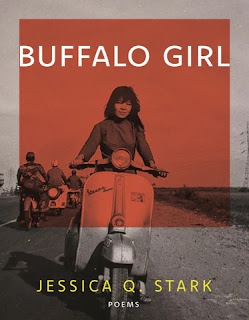Jessica Q. Stark is the author of the new poetry collection Buffalo Girl, which focuses on her mother's immigration to the United States from Vietnam. Stark's other works of poetry include Savage Pageant, and her work has appeared in a variety of publications, including BestAmerican Poetry. She is an assistant professor in creative writing at the University of North Florida.
Q: What inspired you to write Buffalo Girl, and why did you decide to view your mother’s immigration through the lens of the Little Red Riding Hood story?
A: I became interested in the Little Red Riding Hood stories after reading a few different versions to my young son that we’d borrowed from the library.
I turned the story around in my mind as something I hadn’t seriously considered before; this story seems so fixed in my mind culturally—like it had always been there though I can’t recall any specific book version of it from my own childhood.
I was interested in its ability to shapeshift as well. It feels like a very spectral and imprecise cultural artifact, which I find endlessly fascinating. Even if it feels as if it’s always been there, I hold different endings and versions in my mind. The figures in the story are at-once familiar and unpredictable.
I began researching the story and its different iterations and that’s when I discovered what an interesting inheritance this story plants in my mind: a punitive morality tale for a young girl’s curiosity. What a wonder to have passed this down for so long.
I was already writing a little bit about my mother as I was launching my first book, Savage Pageant, and my research on Little Red Riding Hood naturally began intersecting with my thoughts on my mother’s immigration and ideas around femininity, wandering, “victimhood” and inversions of such.
Q: In addition to your poems, the book also includes your mother’s photography from Vietnam as well as vintage illustrations from Little Red Riding Hood books. How did you choose the art to include in your book, and how do you see the relationship between the text and the art?
A: I found these photographs when I was a curious young girl, wandering around in my mother’s closet. They were in a little album booklet stuffed at the back of a drawer.
I remember being enamored with them for a number of reasons. One was that my mother looked so natural, glamorous, joyful, free. These were also some of the only images I’ve seen of my mother in her home country before her immigration to the United States.
It felt like a window into a part of my mother—before her marriage to my father, before the birth of her children—that I had never considered before.
A large part of this book’s preoccupation is in how small pieces of ourselves—our stories, our identities, our histories—remain ever a mystery to other people. I like those furtive pieces. I think there is something magical and strange and radical about acknowledging the inherent unknowability of human nature, of individual lives.
I wanted also to make a direct connection visually with the woods that I inhabit in my collage work with these images—the various flora that permeates where I live in Florida; a lot of tropical plants here also grow in parts of humid Vietnam as well.
As well, bringing in the original illustrations from a version of Little Red Riding Hood felt vital. I wanted these stories and images to bleed all over each other. They are little poems and, in my mind, they speak back to the text of this book.
Q: How was the book's title chosen, and what does it signify for you?
A: My mother is a well of stories. Folktales, personal histories, gossip often intermingle in how she communicates in the most pleasing and disorienting ways. I love this about her. This tendency composes many of my memories of her growing up as a girl.
The world can be (re)shaped this way, too. One of the stories she told me about was about little buffalo girls and boys who would ride water buffalo in rural parts of Vietnam, singing songs while tending rice paddies in the very early morning. Buffalo girls have a very different lineage in American popular culture, and I’ve written about some of this inheritance in the notes section in the back of this book.
Both histories are important to what lies at the heart of this book, which is to say: there exists a fine line between fantasy and reality, of cruelty and survival, of eros and death.
Q: What do you hope readers take away from the book?
A: That contours of the world (and ourselves) that we consider incredibly fixed and immobile are often ever-shifting, and that in these overlooked minutiae, we can find revolution.
Q: What are you working on now?
A: I’m working on a third book, tentatively titled Antoinette, that focuses on the Internet, femininity, fractal identities that exist on and offline. I’m particularly interested in bringing together an examination of the real and imagined personae of Marie Antoinette in conversation with what it feels like to be a woman on the Internet.
I have been writing an ongoing poem about the Internet for about seven years and this project is, in many ways, its refined progeny.
Q: Anything else we should know?
A: More about my work and past publications can be found here: https://jessicaqstark.com/.
--Interview with Deborah Kalb


No comments:
Post a Comment